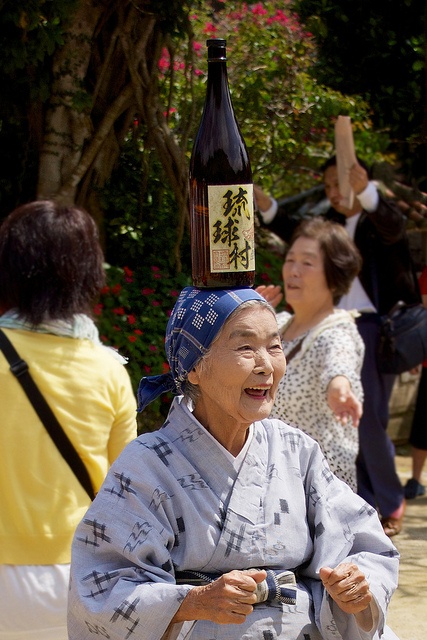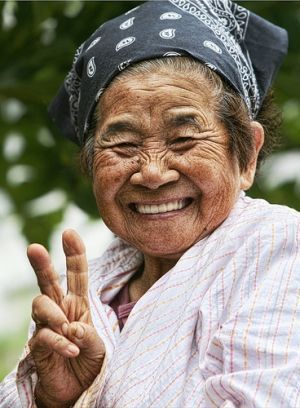Okinawa is a Special Place
Okinawa is a rural prefecture of Japan, famous for the longevity of its population. It is a special place, as on the islands of Okinawa the number of centenarians – i.e. people who live at least 100 years – is one of the highest in the world, in proportion to the total population. Currently there are approximately 700 centenarians living on the islands of Okinawa, according to Dr. Bradley Willcox, a geriatric specialist.

The centenarians and other elderly of Okinawa are a prime example of successful aging. Okinawans do not only live long but they live a long and healthy life. They go through a slow and delayed aging process and they experience cardiovascular disease, cancer, Alzheimer’s Disease and dementia to a much lesser extent than other populations.
Although the genes of Okinawans may play a role in their longevity, the way they live may also give us indications as to a lifestyle supporting a long and healthy life.
The Okinawa Centenarian Study
In order to determine the secret of longevity of the Okinawans, Japan’s Health Ministry has been funding a health study among the Okinawan elderly since 1975. This ongoing health study is The Okinawa Centenarian Study (OCS). The OCS aims to uncover the genetic and lifestyle factors associated with longevity of Okinawans; and based on the results it wishes to improve the health and life expectancy of other populations.
The age of the subjects of the OCS have been validated through the Japanese family registration system, the so-called “koseki”. The physical and mental state of the subjects has been assessed by baseline geriatric examinations. Since the launch of the study in 1975, the assessment of 900 subjects has been carried out and further assessments are to be expected. The OCS is highly respected in the scientific community and its results are assumed to be generally valid.

Let’s see how Okinawans live and try to follow at least some of components of their lifestyle.
Lifestyle Tips of The Okinawans to Support Longevity
According to the results of the OCS, the lifestyle and the unique diet of Okinawans may be the most important factors in favour of their long and healthy lives.
- Okinawans follow a primarily plant-based diet. They eat at least seven servings of vegetables and a few servings of fruits on average, in particular dark green leaves, seaweed, bean sprouts, green peppers, onions and sweet potatoes. The vegetables and fruits they eat tend to come from their own farms and gardens.
- Okinawans used to consume lots of sweet potatoes. It used to be so popular that sometimes it made up to 70% of the traditional Okinawan diet. This may be very significant, as sweet potatoes have a low glycaemic index and contain a type of flavonoid in abundance. The OCS shows that when the sweet potato consumption of Okinawans tended to decrease in favour of rice, type II diabetes and obesity started to increase among the subjects of the study. A lesson to learn is to eat carbohydrates with low glycaemic load, e.g. sweet potatoes instead of white rice.
- Soy consumption is key in the diet of Okinawans, which may be responsible for avoiding menopause symptoms like hot flushes, osteoporosis and heart disease. As soy is a weak estrogen, it creates a protective effect against diseases like breast cancer. Other isoflavones in soy slow the development of prostate cancer, which is virtually non-existent in Okinawa. As soybeans, tofu and miso are eaten every day in Okinawa, it’s time for us too to incorporate them into our diet.
- One of the favourite spices of Okinawans is turmeric, which as been popular since the first imports from India arrived in the 6th Century. Curcumin, the active ingredient of turmeric is assumed to be a powerful anti-inflammatory substance that can be efficiently used in cancer prevention and treatment of tumours. As the cancer rates in Okinawa are exceptionally low, the turmeric consumption of the population may be responsible for the low prevalence of the disease. Check out Terrific Tumeric to know more about this special spice.
- The people of Okinawa eat meat as only a rare treat. They do consume pork and beef, however they do so sparingly and tend to save it for special occasions. They do eat fish in larger quantities but do not eat dairy at all. Their diet is largely vegetable-based and their primary source of protein are legumes and soy. The lesson to learn is to limit meat, fish and dairy intake and try to follow a primarily vegetable & fruit-based diet.
- Okinawans drink lots of water and green tea. They consume up to 12 glasses of water a day and drink lots of unsweetened green tea, too. The potent blend of Okinawan blend of green tea, Sanpin, protects against cancer, heart disease and the aging effects of UV rays. Try to get hold of Sanpin or, if not possible, at least drink lots of Japanese green tea.
- The people of Okinawa start a meal by saying “hara hachi bu”, which roughly means “eat until you are 80% full”. They eat slowly and they stop before getting full. Thanks to this habit Okinawans are accustomed to living on less calories – only 1200 – than other populations. These eating habits reflect their cultural values of respecting moderation and balance. Let’s try to eat less, but more nutrition-rich food, eaten slowly, just as the Okinawans do.
- Last but not least, the Okinawans lead a peaceful, stress-free lifestyle. They wake up at sunrise and go to bed at sunset. There is no rush and no artificial stress in their lives. They meditate, follow the rhythm of nature and they are very optimistic and positive people. It’s a useful lesson to learn from them to limit our exposure to stress and learn to cope with it.
Let us all follow the Okinawans and live long and healthy!

If you are interested in The Okinawa Centenarian Study in more detail, the official website is as follows: http://www.okicent.org/
